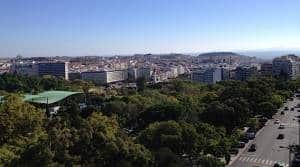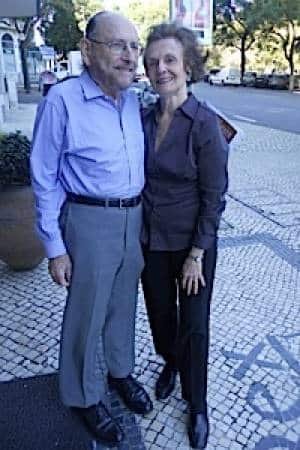By Josh Nathan-Kazis
Part 11: ‘Not Meat or Fish’

I arrived in Lisbon shlubby and tired. The pockets of my jacket were sagging with old receipts and boarding passes, and I worried that I smelled like a budget airline departure lounge. I had lunch at a restaurant on a terrace by the edge of a park. Ordering was hard: I started off in Spanish, realized that wasn’t working, and panicked. I’m pretty sure I tried Spanish with an Italian accent and French, of which I speak zero words, before reverting to wild gestures. Somehow, a soda and a vegetable sandwich wound up in front of me.
I had flown from Madrid to meet an American couple who are helping the descendants of Portuguese conversos to become Jewish.
 It would be exaggerating to call the small numbers of Portuguese and Spanish Catholics seeking Jewish conversions a trend — we’re talking dozens, not scores — but in these small Jewish communities, the converts are hard to miss. I had talked to a few at the Sephardic synagogue in Madrid and had a beer with another big group after services at Stofenmacher’s congregation.
It would be exaggerating to call the small numbers of Portuguese and Spanish Catholics seeking Jewish conversions a trend — we’re talking dozens, not scores — but in these small Jewish communities, the converts are hard to miss. I had talked to a few at the Sephardic synagogue in Madrid and had a beer with another big group after services at Stofenmacher’s congregation.
You can see these converts grasping at Spanish and Portuguese historical identities that were impossible to acknowledge under the authoritarian regimes that ruled Spain and Portugal until the 1970s. The converts’ radical decision to try to become Jewish seems to be an extreme example of the phenomenon of interest in those identities that de la Vara saw at his book fair booth.
It’s hard to say exactly when the ripple of conversions started. Rabbi Jules Harlow and his wife Navah have been coming to Lisbon since 2005. Harlow is a Conservative rabbi; he edited the original 1985 edition of the standard Conservative prayer book. So far, he and Navah have brought 16 Portuguese to the Masorti rabbinic court in London to be converted.
In the lobby of the Sana Rex Hotel, which the Harlows have made their base in Lisbon for the past eight years, I met Filipe Craveiro, who has been studying with the Harlows for four years. Born in 1948 in Caldas da Rainha in western Portugal, Craveiro’s grandmother insisted that the family’s roots were Jewish.
The family didn’t consider itself Jewish — they were Catholic, just like everyone else. And they knew it wasn’t safe to speak openly about their Jewish past. But at home, on Friday nights, they would light incense.
“We were so much afraid to talk about it,” said Sonia Craveiro, Filipe’s cousin.

António de Oliveira Salazar, the Portuguese dictator, had a relationship to the Jews that was similar to Franco’s: The regime was not officially anti-Semitic, and an elite population of Jews in Lisbon was tolerated, and even thrived. But Catholicism was the state religion and a central part of the mandated Portuguese identity, and freedom to stray from those norms was limited.
Shortly after World War II, Craveiro’s family left for Angola, then a Portuguese colony. The regime was less strict there than in Portugal itself, and there was less pressure to conform to the prevailing Catholic identity. When the Angolan uprising began in 1961, however, Craveiro’s world exploded. His family fled to the city. At 11 he was given a gun. “I saw many people die,” he said.
He returned to Portugal in 1975, after the regime had fallen and the colonies were relinquished. The adaptation was hard. Communists were ascendant in Lisbon and they resented the former colonists. Chased from Angola, Craveiro had come home to find that he wasn’t welcome.
When they asked prospective converts why they wanted to be Jewish, they took offense. ‘We are not choosing…We are Jews.’
Talking to Craveiro, it seemed clear that he saw becoming Jewish as a way to make up for all of that. He wasn’t Catholic, he wasn’t Angolan, and he wasn’t exactly Portuguese. He had always felt, he told me, like he was neither “meat nor fish.” Conversion to Judaism would change that. “I want to finish well,” he said.
Craveiro and his cousin fell in with a group of Lisbon-area prospective converts. Members of that group had been the first to reach out to Masorti Olami, the worldwide Conservative movement, back in 2005. Masorti sent the Harlows to investigate. “Were we suspicious? We didn’t know why [they wanted to convert] until we first met them,” Navah said. When she and her husband asked the first of the prospective converts why they wanted to be Jewish, they took offense. “We are not choosing,” they told her. “We are Jews.”
Craveiro had a surgical circumcision three years ago. All that remains is for him to appear before the beit din. The Harlows think that Craveiro will be ready to go before the beit din soon. After that, what will happen is unclear. The problem is that there’s little Jewish life in Lisbon, and basically no Conservative Jewish life.
Masorti converts are not counted for a minyan in the Orthodox synagogue in Lisbon. There are Masorti communities in Madrid and elsewhere in Europe, but many of the prospective converts are struggling economically, and travel is hard. “We’re talking about this constantly,” Navah said. “The sad thing is, they’re going through this and you’re right — what will be their future?”
Fuente: http://m.forward.com
 eSefarad Noticias del Mundo Sefaradi
eSefarad Noticias del Mundo Sefaradi

